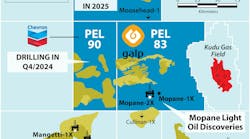Uchenna Izundu
International Editor
LONDON, Apr. 20 -- Nigeria has invited oil and gas companies to bid for 45 blocks in its 2007 licensing round as the country prepares to elect a new president on Apr. 21.
Speaking at a roadshow in London, Nigeria's Energy Minister Edmund Dakoru said there are 11 onshore blocks in the Anambra, Benue, and Borno basins; 12 onshore blocks, 11 deepwater and ultradeepwater blocks, and 11 on the continental shelf, all within the Niger Delta. He stressed that the bidding process would be fair and transparent.
The Anambra Delta is a Cretaceuous—Palaeocene Proto Niger—Benue Delta Complex that developed on the continental crust. Cenozoic Niger Delta developed as regressive offlap sequences.
Companies are expected to submit applications by May 2, and the government expects to sign production-sharing contracts by the end of May. The government also is demanding that 50% of the signature bonus be deposited when companies place their bids, with the balance being collected when PSCs are signed or before.
Dakoru told OGJ the government is pursuing such an aggressive timetable because it wants to dispel Nigeria's reputation for severely prolonging licensing rounds. This one was originally scheduled for fourth-quarter 2006 but was delayed so the government could review the effectiveness of the 2005 bidding round and implement the learned lessons. "Investors want to know that you have a complete and level playing field," he said.
Tony Chukwueke, director of the department for petroleum resources, said most of the blocks on offer in the Niger Delta had been relinquished by companies operating there. He said they have proved reserves "and in some cases existing production."
However, some companies—Repsol Nigeria, Petronas Prod dev Nigeria, CNOOC, Sterling Global E&P, CNPC, and others— have been granted right of first refusal over 20 blocks because they have committed also to invest in downstream projects that the Nigerian government is eager to see within 18 months of awarding the acreage.
Dakoru said this should not stop companies from bidding for those blocks if they are interested, provided they are able to match or exceed the bids of those companies with right of first refusal.
"Such projects as refineries, petrochemical plants, IPPS, gas gathering and gas development infrastructure are encouraged together with the development in the linked sectors of our economy such as transportation, agriculture and power," he added. Nigeria will not negotiate individual production-sharing contracts (PSC) with companies, stressing that it is committed to using the PSC model agreed in 2005, Dakoru said.
The government also has abandoned pairing foreign investors with local Nigerian companies to increase local content. Instead, the government insists that foreign companies find their own indigenous partners to boost local content. Dakoru urged potential investors to hire technical and competent Nigerians because it would be cheaper for them to do so.
Contact Uchenna Izundu at [email protected]
